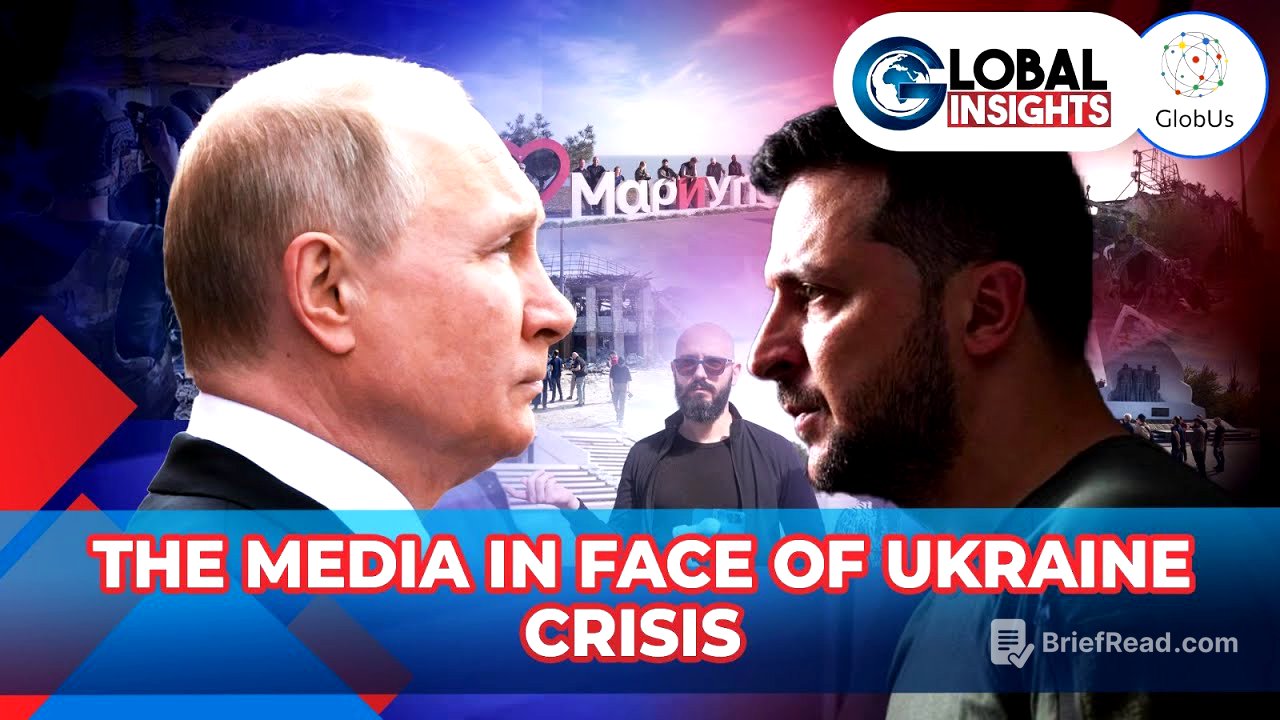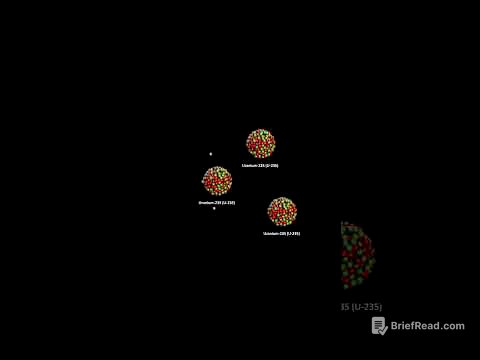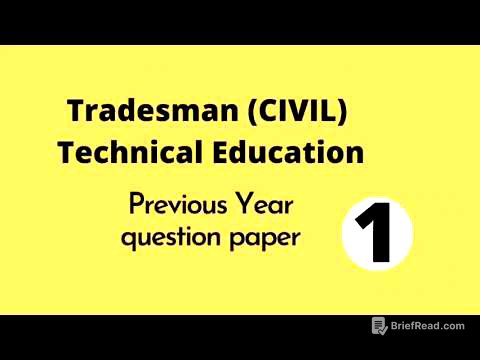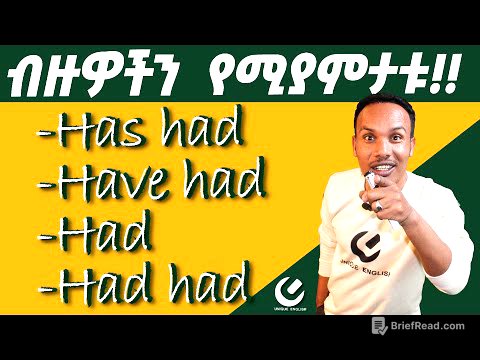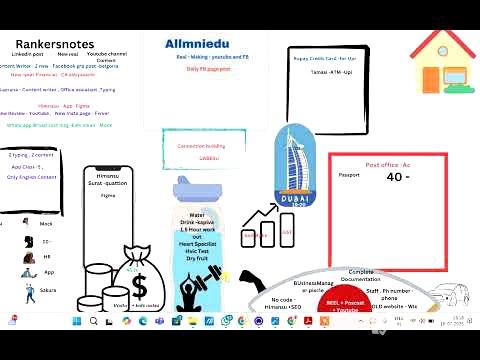TLDR;
This episode of Global Inside on For You Media Africa examines the role of media in the Russia-Ukraine conflict, particularly focusing on a recent press tour to the Donbas region. A panel of experts analyses the media's potential in resolving the crisis, the influence of political agendas, and the challenges journalists face in providing accurate, unbiased reporting. The discussion also covers the importance of alternative information sources and the need for reforms in international institutions to promote peaceful resolutions.
- The media plays a crucial role in shaping public perception of the Russia-Ukraine conflict.
- Political agendas and biases can compromise journalistic integrity.
- Alternative information sources are essential for a balanced understanding of the situation.
- International institutions need reforms to effectively promote peaceful resolutions.
Introduction [0:23]
The program introduces the topic of the Russia-Ukraine crisis, focusing on the contested Donbas area. It highlights a recent press tour where foreign journalists and human rights experts from various countries, including Germany, the United States, Italy, Turkey, and Cameroon, visited the Donetsk People's Republic (DPR). The aim was to provide alternative information to that presented by mainstream media. The journalists visited strategic locations, such as the Azovstal steel plant in Mariupol, and met with DPR leader Denis Pushilin for a question-and-answer session about the crisis. The press tour, from September 27 to October 8, 2024, was facilitated by the Russian Federation's Ministry of Foreign Affairs, which ensured the journalists' security.
Daniel Kovalik's Holistic Analysis of the Situation [3:38]
Daniel Kovalik, a lawyer, human rights scholar, and peace advocate, shares his observations from his fifth visit to the Donbas region. He notes significant improvements in security and infrastructure, particularly in Donetsk and Mariupol, where Russia has invested heavily in reconstruction. Kovalik reminds the audience that the conflict began in 2014, following a US-supported coup that led to a government hostile to the Russian-speaking population in eastern Ukraine. He points out that the Western media often ignores the war between 2014 and 2022 and downplays the role of neo-Nazis in the conflict on the Ukrainian side. Kovalik emphasises that most people in the Donbas are happy with Russian intervention and that there is little evidence of an occupation or partisan movement against the Russians.
The Role of Private Media and Western Interests [9:39]
Kovalik discusses how private media can provide new perspectives on the conflict. He highlights that companies like Black Rock and Vanguard own about 30% of the land concessions in Ukraine, suggesting that the war is partly to protect these investments and the region's mineral resources. He references Senator Lindsey Graham's statement about the US supporting the war to control Ukrainian mineral resources. Kovalik argues that these wars are often about capital and profits, rather than human rights or democracy.
The Relevance of Peace Talks and US Influence [11:15]
Kovalik expresses scepticism about the relevance of current peace talks, noting that Zelensky's presidential term has expired and that the US ultimately controls Ukraine's negotiating position. He believes a deal is only possible between the US and Russia, but unlikely under the Biden Administration. Kovalik recalls a potential peace deal in March 2022 that was allegedly scuttled by the US and UK, underscoring Washington's control over Kyiv. He suggests that some European countries, like Germany, are reconsidering military aid to Ukraine due to the economic harm they are experiencing.
European Perspectives and Local Sentiments in Donbas [16:03]
Kovalik believes Europeans are realising they are among the losers in the conflict, particularly due to being cut off from Russian natural gas, which has damaged their economies. He notes that people in the Donbas are glad Russia intervened and that they voted to join the Russian Federation in a 2022 referendum. Real estate prices increased after the annexation, indicating local confidence in Russian control. Kovalik contrasts the destruction caused by the conflict since 2014 with the hope for infrastructure rebuilding under Russian administration, particularly mentioning the destroyed Donetsk airport.
Censorship, Manipulation, and Journalistic Integrity [19:40]
Kovalik discusses the challenges journalists face in presenting accurate reports from the Donbas without being labelled as propagandists. He advises journalists to visit the regions, speak to locals, and report honestly, despite facing attacks and censorship. He believes independent journalism has been effective in the US, where polls show few Americans view Russia as a threat. Kovalik notes the US government's efforts to suppress independent media outlets like RT and Sputnik, viewing it as a sign that they have lost the information war.
Ozal Kayan's Impressions and Turkish Perspective [23:55]
Ozal Kayan from Turkey's Kanal Foreign News shares his impressions after visiting the Donbas region. He highlights the reunification anniversary and how it brought security and reinforcement to the people of Donetsk and Luhansk. Kayan notes that after reunification, the Russian army began fighting Ukrainian Nazis, reversing the situation. He observed the destruction of war but also new construction efforts. Kayan interviewed DPR leader Pushilin, who stated that Russia started caring for Donbas cities after reunification, unlike the Ukrainian government, which treated the region as separatist.
Turkey's Role and the Necessity of Russia's Intervention [30:19]
Kayan discusses Turkey's complex position as a NATO member that doesn't follow sanctions against Russia but also sells drones and armoured vehicles to Ukraine. He explains that Turkish media generally face Western influence, making it valuable to witness the truth in Donbas. Kayan draws a parallel between the situation in Donbas and Turkey's intervention in Cyprus in 1974, where Turkish citizens were waiting for the Turkish army to help them against Greek attacks. He uses this argument to explain the situation in Donbas to the Turkish audience, emphasising that sometimes civilians need help and an army can intervene.
Encounters with Military Volunteers [36:38]
Kayan recounts visiting two volunteer groups: Ukrainian volunteers and the Ahmed group. The Ukrainian volunteers aim to liberate their country from the Zelensky regime and Nazis, drawing parallels to World War II. These volunteers, still identifying as Ukrainian, fight against the current regime and Nazis with Russian support. The Ahmed group, consisting of volunteers from various Asian countries, fights for their motherland. Kayan notes that these groups are not just Chechen warriors but volunteers from across Asia, fighting for their homeland.
Reactions and Balance in Reporting [42:31]
Kayan addresses the reaction from the Ukrainian government regarding Turkish journalists' involvement in reporting from the Donbas. He explains that while journalists aligned with NATO are welcomed in Ukraine, those seeking the truth in Donbas face attacks from the Ukrainian government. Kayan attributes this to the ongoing information war between NATO and Eurasian forces, with Turkey positioned between East and West.
Yulia Brovkina's Perspective on Political Agendas and Media [45:00]
Yulia Brovkina, a political scientist, expresses admiration for those who risk their lives to report from Donbas. She highlights the courage required due to physical dangers and potential pressure upon returning to EU countries or the US. Brovkina notes that her organisation has facilitated visits for foreign experts and journalists since 2022, allowing them to compare the situation over time. She points out the prevalence of orchestrated fake news campaigns, identifiable by their design and immediate appearance across various sources. Brovkina contrasts this with grassroots data and conversations, which appear more natural and less edited.
The Importance of Grassroots Reporting and International Collaboration [52:08]
Brovkina emphasises the growing interest in covering the situation in Donbas from different angles, even by those who cannot be publicly named. She underscores the importance of raising awareness and providing timely analysis, as well as documenting evidence of war crimes. Brovkina criticises the OSCE mission for not attributing responsibility for shelling civilian populations. She stresses the need to address the consequences of decisions made by military commanders that allowed cruelty against civilians, citing examples like Mariupol and sabotaged humanitarian corridors.
The Impact of Political Affiliation on Media Coverage [53:21]
Christelle Neant discusses the political agendas behind Western news, where journalists often stick to a set narrative to keep their jobs. While acknowledging that journalists cannot be purely neutral, she insists they must be factual. Neant criticises Western media for transforming political agendas into news, often contrary to facts. She believes there is room for journalists who are neutral or even sympathetic to Ukraine, as long as they separate their opinions from factual reporting. Neant suggests reviewing international standards like the Munich Charter to emphasise the importance of factual reporting.
Motivations and Challenges of Reporting from Donbas [59:07]
Neant explains that feedback from her readers motivates her work, providing support and validation despite the complexities and dangers. She highlights the strong relationship built with her audience through constant contact and direct Q&A sessions. Neant acknowledges the difficulties of working in a war zone where her native country is against her, supporting and financing the country that threatens her life. She notes that Ukraine has killed 30 Russian journalists since 2014 and wishes to kill more.
The Role of the International Community and Protecting Journalists [1:03:39]
Brovkina discusses how the work of journalists and experts in conflict zones serves the purpose of being used at major international venues. She cites Daniel Kovalik's presentation at the UN Security Council regarding the use of US and EU-made weapons against civilians. Brovkina also mentions a case of a monastery in the DPR being shelled, which was discussed at the UN Security Council, leading to increased humanitarian aid. She argues that timely analysis and documentation of evidence are crucial, especially given the biased reporting from organisations like the OSCE.
Compromise and Collaboration in Media Coverage [1:08:33]
Brovkina emphasises the importance of balanced reporting, presenting different points of view to provide a comprehensive understanding of the situation. She acknowledges that people in Donbas have their side of the story, as do those in bordering regions of Ukraine. Brovkina stresses the need to show different voices and perspectives, especially in war zones where emotions run high. She argues that people making decisions about weapon supplies should have access to balanced information to inform their choices.
Prospects for Peace and the Role of Alternative Media [1:15:57]
Neant believes that while peace is still a long way off, alternative media is pushing mainstream media to begin telling the truth. She notes increasing coverage of corruption in Ukraine and the dire state of the Ukrainian army. Neant argues that alternative viewpoints are crucial to force mainstream media to abandon their narratives and speak the truth, which will help push for negotiations. She believes that informed citizens will demand an end to the war, potentially leading to social protests and forcing Western governments to change course. Neant suggests that the US presidential election could significantly impact the situation, depending on whether the new president continues or cuts aid to Ukraine.
The International Criminal Court and Multilateral Institutions [1:20:56]
Brovkina discusses the role of international institutions like the UN and the ICC in resolving the crisis. She notes that the UN Security Council has become less functional since the 1990s, citing examples of military operations conducted without its approval. Brovkina criticises the ICC for being used as a political instrument, pointing to the case of Laurent Gbagbo and the arrest warrant for Vladimir Putin. She argues that the allegations against Putin, such as child trafficking, are ridiculous and used as manipulation. Brovkina concludes that these institutions are not functional and that their core documents are not being implemented effectively.
